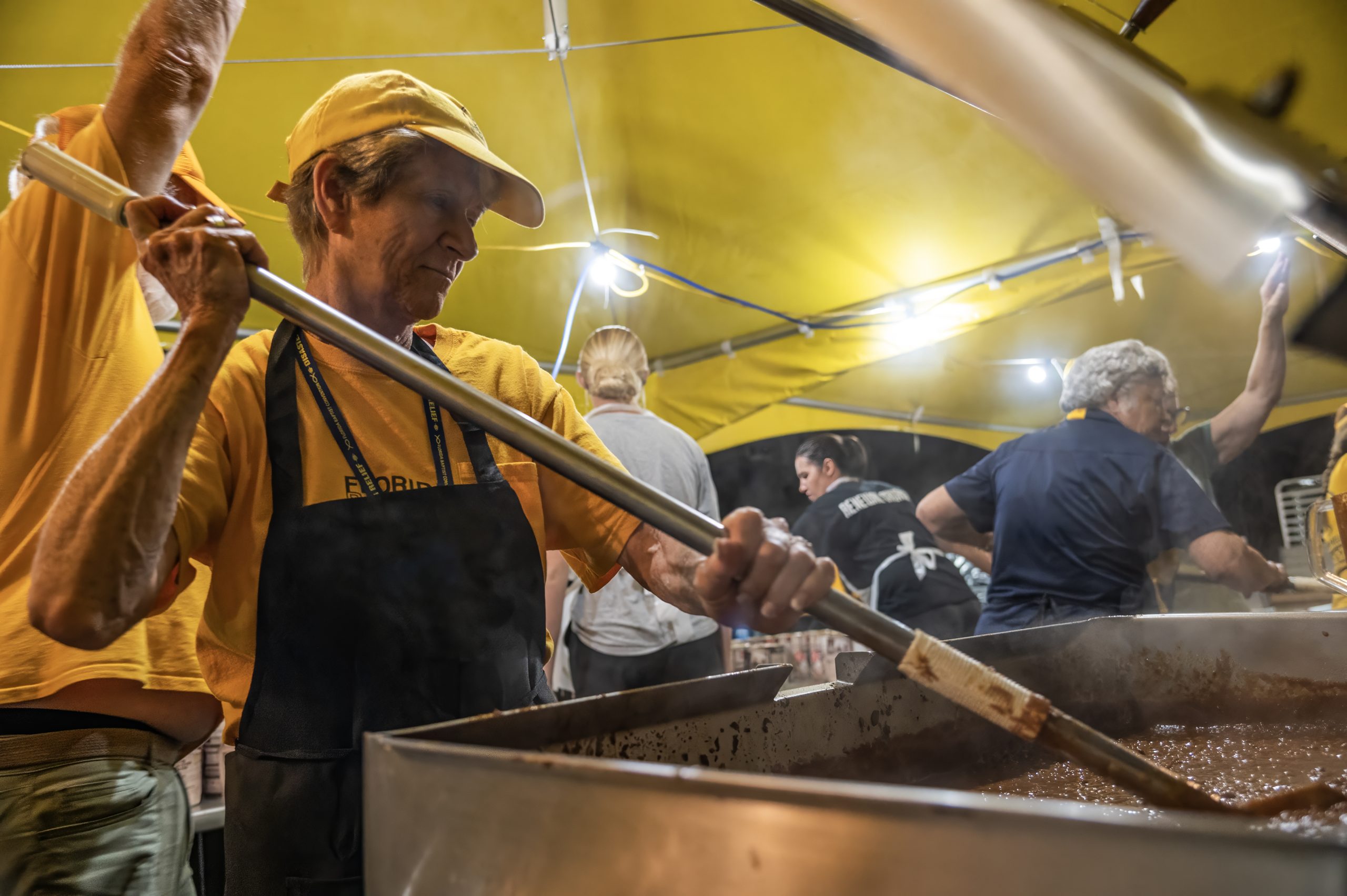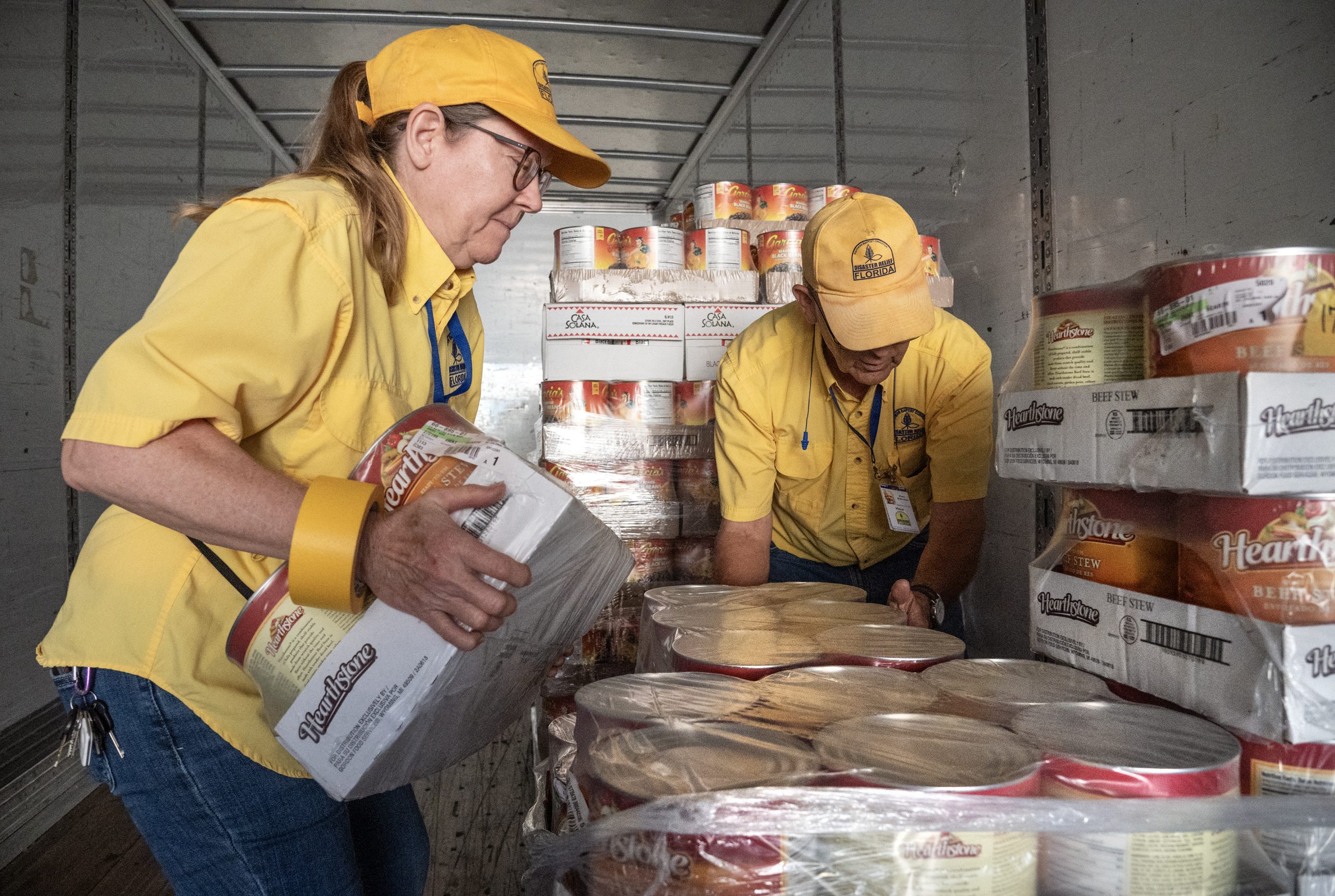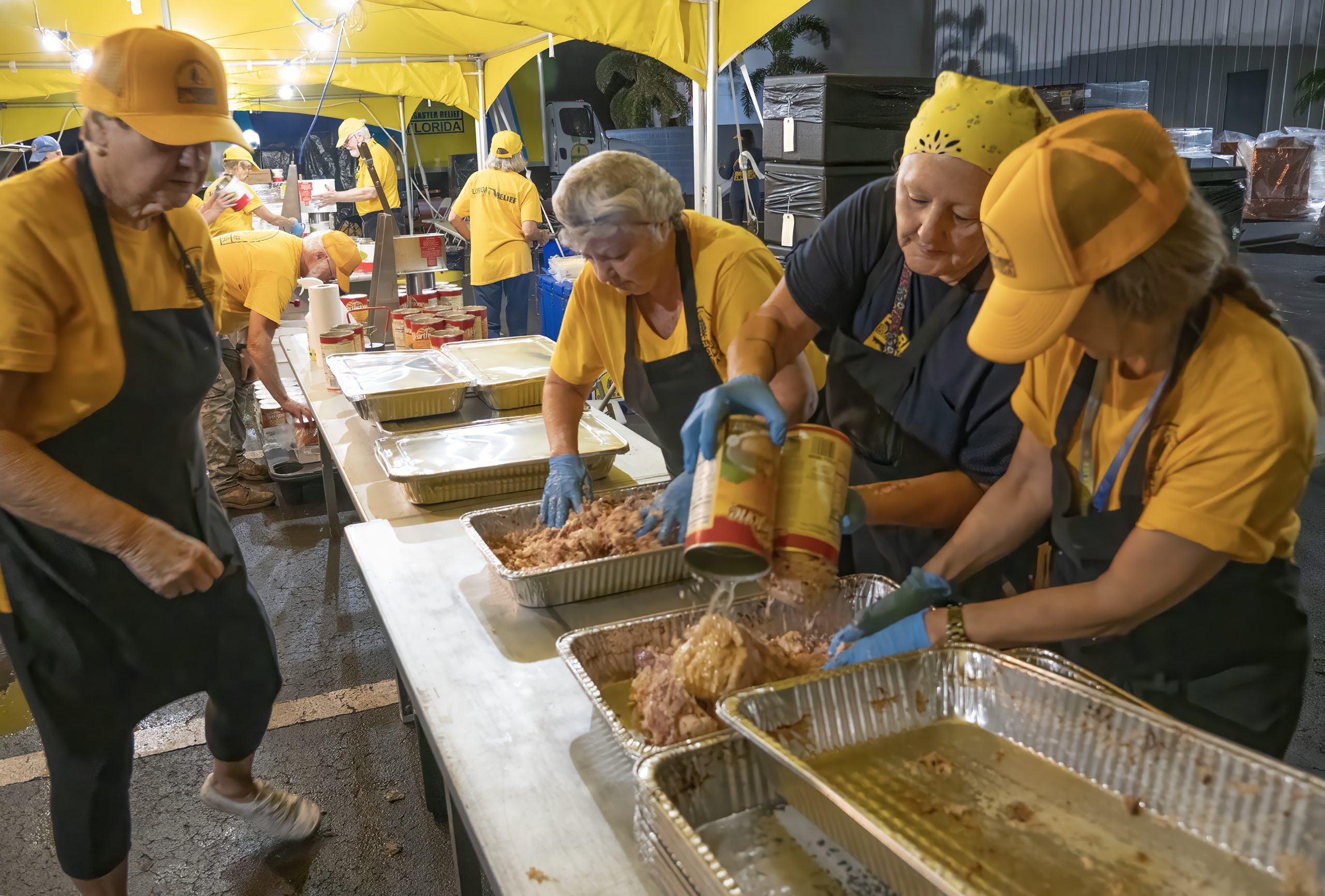
Numbers tell a story: Florida Baptist Disaster Relief volunteers rise early/work tirelessly to feed thousands
Photos by Jim Veneman
SARASOTA–It’s just several hours past midnight when volunteers gather to begin preparing about 9,000 meals for the day as part of one Florida Baptist Disaster Relief feeding team.
On this day, the team, consisting of 10 to 20 volunteers in Sarasota, will prepare about 5,000 hamburgers and 4,000 barbecue pulled pork sandwiches along with 9,000 servings of baked beans. Yes, that’s a lot, but it was just one of eight Florida Baptist Disaster Relief kitchens – five field kitchens and three fixed kitchens – preparing meals to help people impacted by Hurricane Milton in Florida.
And while this work started Oct. 10, a feeding team as well as cleanup and recovery teams were still working the first week of November in Plant City, responding to 659 requests from families still needing assistance after the hurricane, according to Steve Norris, FBDR’s state feeding coordinator. Numbers really do tell a story, which is why he enjoys sharing these results from Oct. 10-Nov. 19 FBDR efforts:
- 64 professions of faith
- 430 Bibles handed out
- 529 gospel presentations
- 7,043 ministry contacts
- 91,805 meals prepared and distributed.
Norris, from Madison Street Baptist Church in Starke, also likes to share what he calls a little-known secret. “Seventy-eight percent of the time when you see the Salvation Army or the American Red Cross anywhere in America at a major disaster, a Baptist kitchen cooked the meal. On any given day, Southern Baptist Disaster Relief is as big or bigger than the Salvation Army or American Red Cross. We have 110 kitchens across the U.S.”
The three organizations now work together, with the Salvation Army and American Red Cross paying for the food and delivering the meals, while Southern Baptist Disaster Relief prepares the meals. Norris oversees operations at all of the FBDR kitchen sites. He and his wife, Vi, have been doing this for 11 years.
‘Can’t do this in own strength’
Back in Sarasota, the team had to have 1,800 meals ready by 9:30 a.m. to go to three Baptist churches in nearby Hillsborough County for church members to distribute. Then at 10:30 a.m. the Salvation Army was picking up 6,500 meals to take for distribution, with FBDR chaplains available during meal distribution to offer words of gospel hope to those impacted by the storm. About 500 meals went to Colonial Oaks Baptist Church, the command center for disaster relief in Sarasota, for members to distribute in the church parking lot.
David Hill, the “blue hat” or director of FBDR feeding operations in Sarasota, typically rises about 2:30 a.m. and starts the day with coffee and his daily Bible reading in the church sanctuary. Then at 3:30 a.m. he makes his way to the kitchen that is set up in a large banquet tent on church property.
“We started with 10 people this morning, but we needed 20. But it’s OK. We just pray that God would send us some help, and He always does,” said Hill, from Murdock Baptist Church in Port Charlotte. “The volunteers just start showing up.”
Each day it’s a mix of experienced and new volunteers, and Hill said it’s easy to show the new volunteers what’s needed. “Our work is not rocket science. I can teach you how to do 90% of what we do pretty quick-like.”
To prepare the foods, the team uses large tilt skillets, also known as braising pans, that can be tilted forward to transfer foods into large storage containers called Cambros. Each Cambro can hold about 150 servings and is used for transporting meals at a safe temperature to sites for distribution, which is a very important part of the process, as Hill will tell you.
“My prayer every morning is that we prepare safe food that tastes good and have fun doing it,” Hill said. “First priority is safety. And then we ty to make the food as tasty as we can make it. We also try to have fun. We really do.”
Hill likes to put up a Bible verse of the day in the kitchen for himself and the volunteers. The first is always Philippians 2:14, “Do everything without complaining or arguing.”
He added, “If anyone starts to complain, I just point to the verse.”
He also likes to use Zechariah 4:6, “Not by might nor by power, but by my Spirit, says the Lord Almighty.”
Hill explained, “This reminds me that we can’t do this in our own strength.”
This team is typically finished up with meal prep by 11 a.m. and then begins cleaning all the equipment. Everything has to be washed down and sanitized. By noon this team has completed all the work and cleaning that started just over eight hours ago.
“By noonish we are free to go and take a nap or do what you want to do. I spend my afternoons ordering food for the next few days. Today I laid down for about 15 minutes before my phone rang.”
900 cans of beans

When placing food orders, Hill tries to order food for several days. That way the team can plan a bit in meal preparation. And when you’re ordering enough food to prepare 9,000 meals, you’re looking at big numbers and lots of cans. That case of 10 cans of beans provides about 100 servings, so that means 90 cases will be ordered, along with 120-ish cases of beef stew, which offer about 75 servings in a case. Pair those with some rice, and you’ll have the basics for a nice hearty meal for hurricane survivors.
But sometimes there are substitutions, just like the orders you place for yourself at the grocery store. And that can cause some issues when your recipe calls for a certain food or a certain number of cans.
“We have put out meals that were not humanly possible,” he said. “I’ve sat there with my mouth open, watching what these people have done. Some foods are easy; some are not. And most of ours on this trip have not been easy to put out. It can be challenging.”
Take the Iroquois Stew for example. That’s what Hill called the conglomeration of canned food items the team combined into a meal several days earlier.
“We had 10 cans of this, 50 of this and 100 of this. It was not enough to put together a meal,” Hill said. “They brought me a list, and we used about 10 different items. We took chili, beef stew, taco meat, sloppy Joes, and we added green beans, corn and peas. We came up with a recipe using those in equal amounts.
“And I gave it a name. If you give it a name, people will eat it,” he said with a laugh, also noting how tasty it was.

Volunteer legacy: ‘Ms. Linda’ mass feeding trailer
Something new to the FBDR scene this hurricane season is the Ms. Linda, a new concession trailer, 20 x 8.5 feet, designed to be the hub of mass feeding. It allows for preparing up to 1,500 meals a day, plus it has water/gas/electric adapters on each corner, allowing the connection of even more tents and cooking equipment to provide as many meals as needed. And it has an outside handwashing station, an important detail for safety reasons.
“We can upsize it really quick with the adapters we have on it,” Norris said.
It was deployed to Perry after Hurricane Milton as the state was requesting 1,000 meals per day at Keaton Beach. After that it headed over to Plant City to help with meals there. It is named after the late Linda Gregory, a volunteer who served as the lead admin with FBDR.
“She was at the state offices almost every day even though she was not a paid employee but a volunteer,” Norris said. “She was very faithful to keep us running.”
Volunteers always needed
More volunteers like Ms. Linda are always needed, whether you have a week to give or only a day. For those wanting to serve, volunteer training is regularly available. Norris coordinates the volunteer training, which will be held at various locations and on various dates in 2025.
Being a disaster relief volunteer, while often demanding, is always rewarding, believes Hill. Originally from Kentucky, Hill and his wife, Debbie, have been volunteering with Florida Baptist Disaster Relief since 2004. The retirees bring their camper with them to every assigned feeding site. He said this is the only type of Florida lifestyle that interests them.
